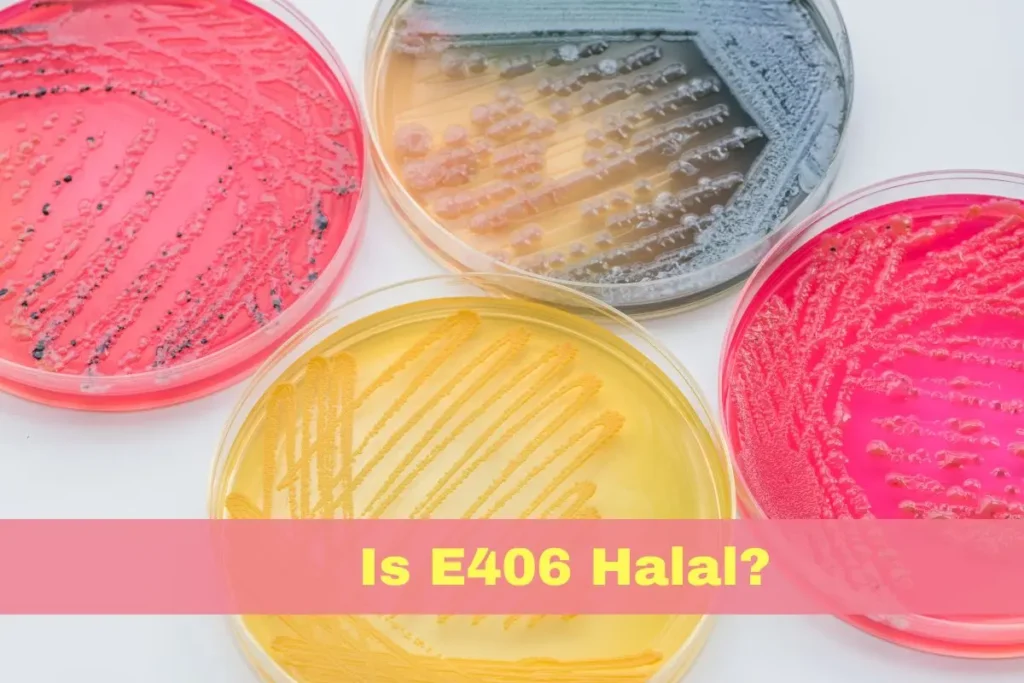Key Takeaways
Have you ever wondered whether the food emulsifier E406 is permitted according to Islamic law? In this article, we’ll take a deep dive into E406 and determine if it is halal or haram.
| 📌 E406, also known as agar or agar-agar, is a food additive derived from certain types of red algae. It is used as a thickener, stabilizer, or gelling agent in foods like desserts, sweets, and vegetarian products. |
| 📌 E406 is considered halal (permissible) in Islamic dietary laws because it is derived from plants and its extraction process does not involve alcohol or animal-derived substances. |
| 📌 Regulatory bodies around the world have deemed E406 safe for consumption at common levels. It is widely used in food products and is not banned in any country. |
What is E406?
E406, also known as agar or agar-agar, is a food additive used as a thickener, stabilizer, or gelling agent. It is derived from certain types of red algae and has widespread use in foods like desserts, sweets, and vegetarian products where gelatin would otherwise be employed.
Chemical Structure
On a molecular level, E406 is a polymer made of repeated galactose and 3,6-anhydrogalactose units. Its chemical formula is C14H24O9 and it has a linear, helicoidal structure responsible for its gelling properties in solution.
What Is E406 Made From?
Agar is produced from different species of red algae in the Gelidaceae and Gracilariaceae families, most notably the Gelidium and Gracilaria genera. The algae are cleaned, dried, and boiled or treated with alkaline solutions to extract the hydrocolloid polysaccharides from the cell walls.
Possible Side Effects
E406 is generally recognized as safe for human consumption by international bodies. However, it may cause mild side effects like flatulence, abdominal discomfort, or diarrhea in some individuals. People with known polysaccharide intolerances should check with their doctor before consuming E406.
Regulations and Guidelines
The Food and Drug Administration (FDA) considers agar safe as a direct food substance and has assigned it the number E406. It also has GRAS status according to the FDA. The Joint FAO/WHO Expert Committee on Food Additives (JECFA) also deemed agar safe.
Dosage and Administration
Agar is used in minute amounts as a food additive, generally between 0.5-3.0% by weight of the product. The typical daily intake from food sources is estimated to be 1-5 grams. No adverse effects have been reported within this range.
Is E406 Halal or Haram?
Most Islamic scholars agree that agar is halal because it is derived from plant sources. The algae it comes from are not listed as specifically haram in the Quran or hadiths.
Furthermore, its extraction process does not involve any alcoholic solutions or animal-derived substances that could render it non-halal. So E406 is halal (permitted) according to Shariah law and guidelines.
Find out more:
Is E405 Halal or Haram?
Is E407 Halal or Haram?
Conclusion
In summary, the food emulsifier E406 known as agar is halal for Muslim consumption. It is a safe hydrocolloid derived from red algae through a process that does not conflict with Islamic rulings on food. While some individuals may experience minor digestive issues, it presents no religious concerns from an Islamic viewpoint.
Allahu A’lam (Allah Knows Best)
FAQ
What is the source of E406?
E406 comes from certain types of edible red algae, primarily from the genera Gelidium and Gracilaria.
Is E406 safe for consumption?
Yes, all international food regulatory bodies that have reviewed agar have determined it to be safe at common levels of intake from foods.
What are some common food products that contain E406?
E406 is found naturally or added to many desserts, sweets, jellies, vegetarian products, and canned or bottled products needing stabilization or thickening.
What is the CAS number of E406?
The Chemical Abstracts Service (CAS) registry number for agar is 9000-18-0.
Is E406 banned in any country?
No, E406 is permitted as a food additive worldwide according to international standards and regulatory agencies.
- Is Pop Tarts Halal? What You Need to Know - February 18, 2024
- Are Graham Crackers Halal in Islam? - January 19, 2024
- Is Keebler Wheatables Halal? - January 18, 2024





